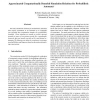285 search results - page 17 / 57 » Computationally Sound, Automated Proofs for Security Protoco... |
CSFW
2010
IEEE
13 years 11 months ago
2010
IEEE
Nowadays it is widely accepted to formulate the security of a protocol carrying out a given task via the "trusted-party paradigm," where the protocol execution is compar...
CTRSA
2005
Springer
14 years 1 months ago
2005
Springer
Traditional password-based authentication and key-exchange protocols suffer from the simple fact that a single server stores the sensitive user password. In practice, when such a ...
CSFW
2007
IEEE
14 years 1 months ago
2007
IEEE
We study simulation relations for Probabilistic Automata that require transitions to be matched up to negligible sets provided that computation lengths are polynomially bounded. T...
LICS
2002
IEEE
14 years 15 days ago
2002
IEEE
Proof-Carrying Code (PCC) is a general framework for verifying the safety properties of machine-language programs. PCC proofs are usually written in a logic extended with language...
WECWIS
2005
IEEE
14 years 1 months ago
2005
IEEE
A zero-knowledge proof (ZKP) is an interactive proof that allows a prover to prove the knowledge of a secret to a verifier without revealing it. ZKPs are powerful tools to deal wi...

